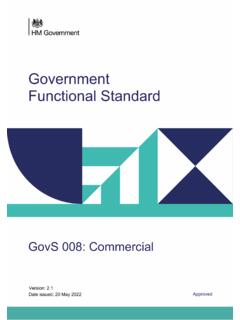Transcription of The Abolition of the Death Penalty in the United Kingdom
1 How it Happened and Why it Still MattersJulian B. Knowles QCThe Abolition of the Death Penalty in the United Kingdom 2015 Julian B. Knowles QCAll rights reserved. No part of this publication may be reproduced or transmitted in any form or by any means, electronic or mechanical, including photocopying, recording or any information storage retrieval system, without permission in writing from the of this monograph may be obtained from:The Death Penalty Project8/9 Frith StreetSohoLondonW1D 3 JBor via our website: : 978-0-9576785-6-9 Cover image: Anti- Death Penalty demonstrators in the UK in Evans PicturE LibraryAcknowledgementsThis monograph was made possible by grants awarded to The Death Penalty Project from the Swiss Federal Department of Foreign Affairs, the United Kingdom Foreign and Commonwealth Office, the Sigrid Rausing Trust, the Oak Foundation, the Open Society Foundation, Simons Muirhead & Burton and the United Nations Voluntary Fund for Victims of author would like to dedicate this monograph to Scott W.
2 Braden, in respectful recognition of his life s work on behalf of the condemned in the United ..4 Introduction ..5A brief history of capital punishment in the United Kingdom up until the 19th century ..6 The Bloody Code ..9 Reform of the Bloody Code ..11 The ending of public executions ..13 Executions for offences other than murder during the 20th century ..1420th-century restrictions on capital punishment ..18 The growth of the Abolition movement in the early 20th century ..29 Moves in Parliament to abolish capital punishment ..30 Three controversial cases Timothy Evans ..32 Derek Bentley ..39 Ruth Ellis ..46 Suspension and then Abolition of the Death Penalty in the United attempts to reintroduce capital punishment.
3 56 The impact of the United Kingdom s international law obligations on the Death Penalty ..57 The impact overseas of the use of the Death Penalty in the United Kingdom ..61 Conclusion: Why the Abolition of the Death Penalty in the UK still matters ..64 Author ..673 ForewordAs a barrister, Julian Knowles has been at the forefront of the fight against the Death Penalty worldwide for years. He has been involved in many of the leading Death Penalty cases in the Privy Council and the Caribbean Courts of Appeal as well as working on Death row cases in Oklahoma and Florida for three years after graduating from this study, he draws on his own extensive experience, as well as his profound knowledge of English legal history, to analyse the very particular process of Abolition in the United other countries, Abolition has followed revolution or liberation, as in South America; or legal challenge, as in South Africa; or has been part of a continental movement towards Abolition , as has been the case with Abolition in eastern Europe.
4 In the United Kingdom , as Knowles shows, it is to Parliament and the individual consciences of MPs taking a political and moral lead that we owe the Abolition of the Death this study also reveals the very important part in the movement to Abolition played by the widespread popular outrage at the injustice and inhumanity of individual executions in the 1950s and, in particular, the three controversial cases of Timothy Evans, Derek Bentley, and Ruth Ellis. The analysis of those cases and their impact is one of the most valuable aspects of this study. But it also shows the crucial role played by campaigning organisations such as the Howard League and the National Council for the Abolition of the Death two countries and no two continents are alike in their reasons for will lead to Abolition in the retentionist states that remain is not predictable.
5 However, this study is not just of historical interest. It points to the need to press for Abolition on many different levels. Reasoned debate, political campaigning, and historical parallels are all crucial. But so too is the work of detailed analysis and advocacy in individual Death row cases. Nothing can more eloquently make the case for Abolition than the specific analysis of individual cases whether it be the execution of the abused Filipino maid Flor Contemplacion in Singapore, the cases of Derek Bentley and Timothy Evans in the United Kingdom or the tragic case of the orphan Dave Wilson from St Kitts, otherwise called Mr. Shit because he was found abandoned in a public latrine.
6 Mr. Wilson was executed before he had a chance to appeal his case as he did not have a lawyer to represent him and nobody to speak on his behalf. This study greatly contributes to the cause of Abolition not just by its analysis of the way in which momentum for change gathered in the United Kingdom , but also by the way it looks at actual cases including the whole forgotten history of executions for cowardice in World War Fitzgerald CBE QCDoughty Street ChambersNovember 20154 IntroductionThis year marks the 50th anniversary of the enactment of the Murder ( Abolition of the Death Penalty ) Act 1965, which suspended and effectively abolished the Death Penalty for capital murder in England, Scotland and The Abolition of capital punishment2 represented perhaps the most important policy change during an era of marked social liberalisation and enlightened thinking.
7 It was a Conservative Home Secretary, Henry Brooke MP, who, in August 1964, authorised the final two executions carried out in the United In October 1964, the electorate, tired of the Conservative governments of Harold Macmillan and then, brief ly, Sir Alec Douglas-Home, handed power to Harold Wilson s Labour Party. Wilson allowed Parliamentary time for Sydney Silverman MP s Private Member s Bill, the Murder ( Abolition of the Death Penalty ) The 1965 Act meant that future Home Secretaries would not have to exercise judgment over life and Death . The purpose of this paper is to examine the history of capital punishment in the United Kingdom and, in particular, the sequence of events that led to its Abolition ; to assess the impact that domestic and international law would have on any attempt to reintroduce it; to look at the legacy of the Death Penalty in the former British colonies that are now independent, and in the British Overseas Territories; and to consider the implications that the use of the Death Penalty abroad has for extradition and asylum cases in the United Kingdom .
8 Abolition did not come about as the result of one single event, or for one reason alone. It happened because of a combination of sustained Parliamentary campaigning; public disquiet over three controversial executions in the 1950s; botched reforms to the law of murder in the 1950s; and changing attitudes towards social and penal affairs, most of all, the acceptance by an enlightened majority of MPs that the state just ought not to be in the business of taking human life. It is worth emphasising that this was a Parliamentary decision which was not supported by the public: Abolition came in the face of popular support in the UK for capital punishment, at least in the abstract, which has lasted more or less until the present The legacy left by our use of capital punishment continues to impact directly on the United Kingdom s relations with other countries who still deploy judicially sanctioned homicide as part of their legal systems.
9 It should be a matter of real pride that the United Kingdom is now a vocal opponent of the Death Penalty worldwide, and that the painful lessons it learned on its journey to Abolition some of which are examined here continue to matter. 1 The 1965 Act received Royal Assent on 8 November 1965 and, in accordance with s 3(4), came into force the following day. The Act did not extend to Northern Ireland, and capital punishment for murder was abolished there by the Northern Ireland (Emergency Provisions) Act 1973, s 1. The last execution in Northern Ireland, that of Robert McGladdery, took place on 20 December The Death Penalty remained on the statute book until 1998 for treason, piracy with violence, arson in Her Majesty s dockyards, and military offences, but no executions had been carried out since 1946 for any offences other than murder.
10 3 These took place on 13 August 1964, when Gwynne Owen Evans was hanged at HMP Manchester and Peter Allen was hanged at HMP Liverpool, both for the murder of John Alan West on 7 April While the Government was officially neutral, the Bill had unofficial Government support and had been mentioned in the 1964 Queen s Speech: Hansard, HC Deb 21 December 1964, vol 704 cc870-1010. 5 Gallup polls were collected on the topic of capital punishment from 1938. For an overview of mid-20th century American and European results, which includes Britain, see Erskine H., Capital Punishment: The Polls , Public Opinion Quarterly, 1970, 34(2): 290-307. 56 The Abolition of the Death Penalty in the United Kingdom A brief history of capital punishment in the United Kingdom up until the 19th centuryThe first generally recognised written Death Penalty laws can be found in the Sumerian Code of Mesopotamian King Ur-Nammu,6 which stipulated that the crimes of murder, rape, robbery and adultery were to be punished by Death .

